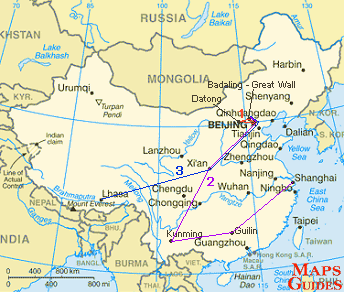The People's Republic of China (simplified Chinese: 中华人民共和国; traditional Chinese: 中華人民共和國; pinyin: Zhōnghuá Rénmín Gònghéguó listen), commonly known as China, is the largest country in East Asia and the third or fourth largest country in the world. With a population of over 1.3 billion, it is the most populous country in the world. The Communist Party of China (CPC) has led the PRC under a single-party system since the state's establishment in 1949. The PRC is involved in a long-running dispute over the political status of Taiwan. The CPC's rival during the Chinese Civil War, the Kuomintang (KMT), fled to Taiwan and surrounding islands after its civil war defeat in 1949, claiming legitimacy over China, Mongolia, and Tuva while it was the ruling power of the Republic of China (ROC). The term "Mainland China" is often used to denote the areas under PRC rule, but sometimes excludes its two Special Administrative Regions: Hong Kong and Macau. Because of its vast population, rapidly growing economy, and large research and development investments, China is considered an "emerging superpower". It has the world's fourth largest economy (second largest in terms of purchasing power parity.) China is also a permanent member of the United Nations Security Council and Asia-Pacific Economic Cooperation. Since 1978, China's market-based economic reforms have brought the poverty rate down from 53% in 1981 to 8% by 2001. However, China is now faced with a number of other economic problems, including an aging population, an increasing rural-urban income gap, and rapid environmental degradation. China plays a major role in international trade. The country is the world's largest consumer of steel and concrete, using, respectively, a third and over a half of the world's supply of each. Counting all products, China is the third largest importer and the second largest exporter in the world.
WikipediaFor centuries China stood as a leading civilization, outpacing the rest of the world in the arts and sciences, but in the 19th and early 20th centuries, the country was beset by civil unrest, major famines, military defeats, and foreign occupation. After World War II, the Communists under MAO Zedong established an autocratic socialist system that, while ensuring China's sovereignty, imposed strict controls over everyday life and cost the lives of tens of millions of people. After 1978, his successor DENG Xiaoping and other leaders focused on market-oriented economic development and by 2000 output had quadrupled. For much of the population, living standards have improved dramatically and the room for personal choice has expanded, yet political controls remain tight.
CIA The World Factbook 




